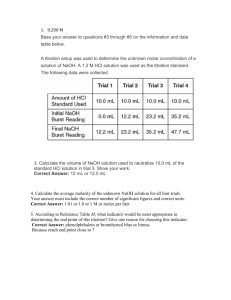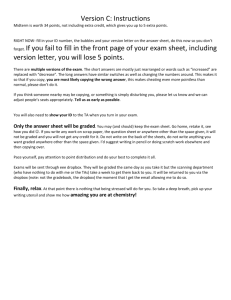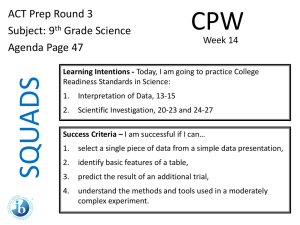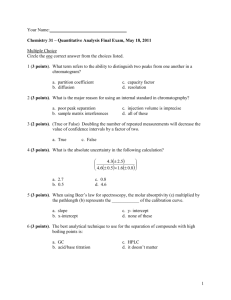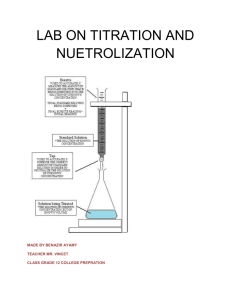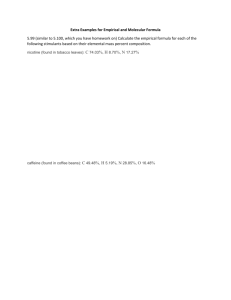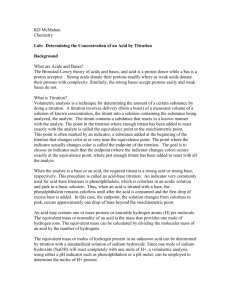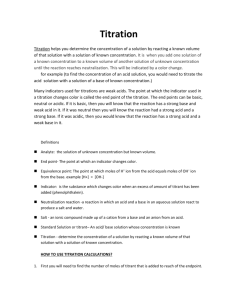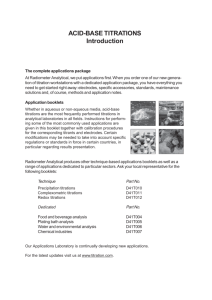Titratable Acidity in Wines or Juices
advertisement
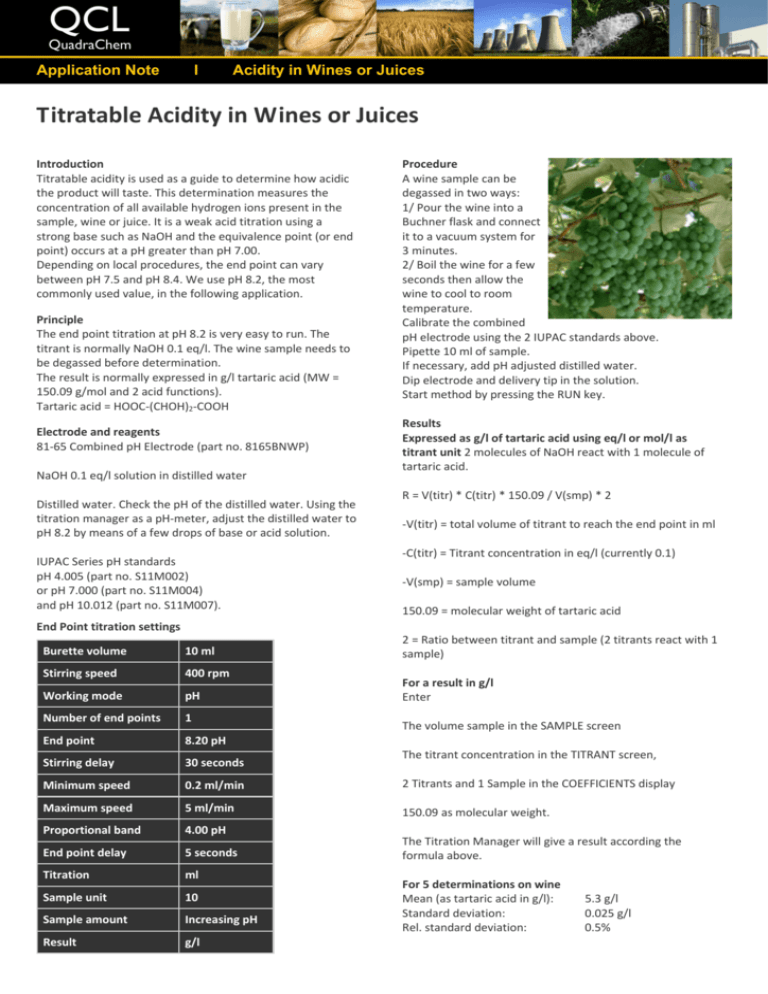
Application Note l Acidity in Wines or Juices Titratable Acidity in Wines or Juices Introduction Titratable acidity is used as a guide to determine how acidic the product will taste. This determination measures the concentration of all available hydrogen ions present in the sample, wine or juice. It is a weak acid titration using a strong base such as NaOH and the equivalence point (or end point) occurs at a pH greater than pH 7.00. Depending on local procedures, the end point can vary between pH 7.5 and pH 8.4. We use pH 8.2, the most commonly used value, in the following application. Principle The end point titration at pH 8.2 is very easy to run. The titrant is normally NaOH 0.1 eq/l. The wine sample needs to be degassed before determination. The result is normally expressed in g/l tartaric acid (MW = 150.09 g/mol and 2 acid functions). Tartaric acid = HOOC‐(CHOH)2‐COOH Electrode and reagents 81‐65 Combined pH Electrode (part no. 8165BNWP) NaOH 0.1 eq/l solution in distilled water Distilled water. Check the pH of the distilled water. Using the titration manager as a pH‐meter, adjust the distilled water to pH 8.2 by means of a few drops of base or acid solution. IUPAC Series pH standards pH 4.005 (part no. S11M002) or pH 7.000 (part no. S11M004) and pH 10.012 (part no. S11M007). Procedure A wine sample can be degassed in two ways: 1/ Pour the wine into a Buchner flask and connect it to a vacuum system for 3 minutes. 2/ Boil the wine for a few seconds then allow the wine to cool to room temperature. Calibrate the combined pH electrode using the 2 IUPAC standards above. Pipette 10 ml of sample. If necessary, add pH adjusted distilled water. Dip electrode and delivery tip in the solution. Start method by pressing the RUN key. Results Expressed as g/l of tartaric acid using eq/l or mol/l as titrant unit 2 molecules of NaOH react with 1 molecule of tartaric acid. R = V(titr) * C(titr) * 150.09 / V(smp) * 2 ‐V(titr) = total volume of titrant to reach the end point in ml ‐C(titr) = Titrant concentration in eq/l (currently 0.1) ‐V(smp) = sample volume 150.09 = molecular weight of tartaric acid End Point titration settings 2 = Ratio between titrant and sample (2 titrants react with 1 sample) Burette volume 10 ml Stirring speed 400 rpm Working mode pH Number of end points 1 End point 8.20 pH Stirring delay 30 seconds Minimum speed 0.2 ml/min 2 Titrants and 1 Sample in the COEFFICIENTS display Maximum speed 5 ml/min 150.09 as molecular weight. Proportional band 4.00 pH End point delay 5 seconds Titration ml Sample unit 10 Sample amount Increasing pH Result g/l For a result in g/l Enter The volume sample in the SAMPLE screen The titrant concentration in the TITRANT screen, The Titration Manager will give a result according the formula above. For 5 determinations on wine Mean (as tartaric acid in g/l): Standard deviation: Rel. standard deviation: 5.3 g/l 0.025 g/l 0.5% Working range With current figures (0.1 for C(titr) and 10 for V(smp) and a low limit around 0.5 for V(titr) we can consider 0.375 g/l as an experimental limit. Using application note conditions (10 ml volume sample and 10 ml titrant burette) it is possible to obtain results between 2.60 g/l (for 35% capacity of the burette) and 7.40 g/l (capacity of the burette) with the best possible accuracy and reproducibility. If the result is different from that expected, change cylinder capacity of the burette and/or the sample volume. For samples with very low acidity you can also use a low concentration titrant (0.02 eq/l titrant gives a low limit for the result equal to 0.075 g/l for a 10 ml sample). You can also take a larger amount of sample. Notes 1) Normally the result is expressed as g/l of tartaric acid 1 ml of NaOH 0.1 eq/l represents 7.5 mg of tartaric acid Application Note 024A‐FD 2) Depending on local regulations, other acids can be used for the expressed result; for example • Acetic acid (1 ml of NaOH 0.1 eq/l = 6.005 mg) • Citric acid (anhydrous) (1 ml of NaOH 0.1eq/l = 6.40 mg) • Lactic acid (1 ml of NaOH 0.1 eq/l =9.01 mg). QuadraChem Laboratories Ltd Riverside l Forest Row Business Park l Forest Row l East Sussex l RH18 5DW l UK t 01342 820820 f 01342 820825 e enquiries@qclscientific.com w www.qclscientific.com QuadraChem are UK distributors for
